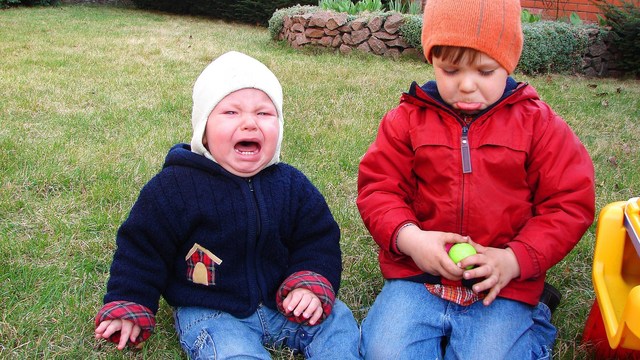 NickNick/PhotoSpin
NickNick/PhotoSpin
Everyone who has ever watched their child kick and scream at seemingly the smallest things has probably felt at some point like a complete failure as a parent.
After all, a good parent has an extremely well-behaved child who instantly obeys and listens and knows that when mom says no, mom means no and will just go along with it, right?
Anything else resembling defiant, rude, non-compliant and disobedient behavior is a sign of a bad parent , right?
WRONG! Particularly when it comes to children aged 18 months to 4 years.
Temper Tantrums Explained: Immature Brain Development
Michael Potegal, Ph.D., a pediatric neuropsychologist at the University of Minnesota who has studied tantrums during his professional career, says that these temper “outbursts are a normal biological response to anger and frustration as a yawn is to fatigue. So normal, in fact, that you can make a science out of the progression of a tantrum and predict one down to the second.” (1)
“Kids from about 18 months to 4 years are simply hardwired to misbehave” because the prefrontal cortex (PFC), the area of the brain responsible for regulating emotions and controlling social behavior is the last area of the brain to develop, and has only just begun to mature at age four. (1)
A report out of the University of Pennsylvania says that the underdevelopment of the PFC “may serve an important developmental role in the acquisition of language ... [and] allows children to master a new language much more easily than adults.” (1)
This may come as little consolation when you and your child(ren) are in the middle of one of these episodes.
Temper Tantrums Explained: Stress
Temper tantrums are also a child’s way of dealing with perceived stress, and parents must remember that children perceive stress in situations adults wouldn’t normally deem stressful. Children also deal with stress much differently than adults.
Gina Mireault, Ph.D., professor of psychology at Johnson State College (Vermont), explains it this way, “Kids this age think magically, not logically ... Events that are ordinary to us are confusing and scary to them. They don’t understand that the bathtub drain won’t swallow them or that their uncle can’t really snatch their nose.” (1)
A heightened sense of stress triggers a “fight or flight” response as the body produces the hormone cortisol which increases blood pressure, increases rate of breathing, and results in confused or unclear thinking.
Fatigue, hunger and changes in sleep patterns may also play a role in triggering a temper tantrum and adds to the stress your child is perceiving and experiencing.
3 Temper Tantrum Parenting Traps
Michael Potegal warns parents of three parenting traps that, if avoided, can help a parent regain control.
The first is the “anger trap”
Don’t react to the tantrum in anger and frustration. Potegal says that getting as mad and irrational as your child is like “throwing gas on a fire”. (1)
Instead, remain calm. You’re trying to teach the child that yelling and screaming and kicking is inappropriate behavior ... that lesson goes completely out the window if you, the parent, are yelling and screaming and kicking back.
The second is the “sadness trap”
Comforting a child while in the middle of the tantrum only reinforces the bad behavior. Instead, offer support and sympathy “while still showing your tot how to regulate his emotions” (1) by saying something like “I know you’re upset and angry with me right now. When you’ve calmed down we can talk about it.” (Writer’s note: This approach really does work.)
The third is the “escape trap”
This happens when a child is protesting having to do or not do something. In this case, the support and sympathy reaction is not effective because it allows your child to get away with not following your instructions or rules. Time-out is also not an ideal option because, again, your child is not following through.
“Every second he’s not complying, he’s winning ... Instead, tell your [child] that if he doesn’t get dressed in five seconds, you’re going to put your hands on his and do it together ... If your child begins to slap or bite you, continue putting the coat on and then put him in time-out ... [t]hat way your child sees he still has to wear the coat [and that] his protests were ineffective.” (1)
Sources:
1) Why Toddlers Throw Temper Tantrums. Onderko, Patty. Parenting.com. Web. Accessed: Mar 24, 2014.
http://www.parenting.com/article/toddler-temper-tantrums
2) Temper Tantrums. U.S. National Library of Medicine NIH National Institutes of Health. MedlinePlus. Web. Accessed: Mar 24, 2014.
http://www.nlm.nih.gov/medlineplus/ency/article/001922.htm
3) How to Handle a Temper Tantrum. WebMD. Web. Accessed: Mar 24, 2014.
http://www.webmd.com/parenting/guide/preventing-temper-tantrums-in-children
4) Temper Tantrums. Early Childhood Parenting Center. Web. Accessed: Mar 24, 2014.
http://www.ecpcla.org/2013/08/23/temper-tantrums
Reviewed March 24, 2014
by Michele Blacksberg RN
Edited by Jody Smith





Add a CommentComments
There are no comments yet. Be the first one and get the conversation started!